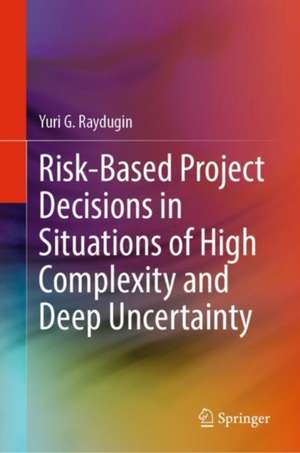Risk-Based Project Decisions in Situations of High Complexity and Deep Uncertainty
Autor Yuri G. Rayduginen Limba Engleză Hardback – 7 iun 2024
Preț: 652.49 lei
Preț vechi: 767.63 lei
-15% Nou
Puncte Express: 979
Preț estimativ în valută:
124.89€ • 128.70$ • 105.43£
124.89€ • 128.70$ • 105.43£
Carte tipărită la comandă
Livrare economică 03-17 martie
Preluare comenzi: 021 569.72.76
Specificații
ISBN-13: 9783031569876
ISBN-10: 3031569873
Ilustrații: XXVII, 382 p. 94 illus., 5 illus. in color.
Dimensiuni: 155 x 235 mm
Greutate: 0.75 kg
Ediția:2024
Editura: Springer Nature Switzerland
Colecția Springer
Locul publicării:Cham, Switzerland
ISBN-10: 3031569873
Ilustrații: XXVII, 382 p. 94 illus., 5 illus. in color.
Dimensiuni: 155 x 235 mm
Greutate: 0.75 kg
Ediția:2024
Editura: Springer Nature Switzerland
Colecția Springer
Locul publicării:Cham, Switzerland
Cuprins
Introduction.- PRM and types of project uncertainties.- Overview of DMDU methodologies.- Project complexity concept.- Decision-making framework.- Selection of project options in situations of deep uncertainty.- Development of project schedule and cost contingencies in complex projects.- Cost escalation and exchange-rate volatility risk assessment methods.- High-level overview of simplistic Monte Carlo and parametric risk assessment methods.- Case study 1: applications of a tradition PRM (scoring method).- Case study 2: applications of “linear Monte Carlo” methodology.- Case study 3: applications of “non-linear Monte Carlo” methodology.- Case study 4: selection of project options (a few “futures”).- Case study 5: selection of project options (multiple “futures”).- Case study 6: applications of cost escalation and exchange-rate volatility modelling methods.- Conclusion.
Notă biografică
Dr Yuri Raydugin is Principal Consultant of Risk Services & Solution Inc©, a Canadian consulting company. Previously Yuri worked for Saudi Aramco, Royal Dutch Shell, TransCanada Pipelines, and SNC-Lavalin managing risks of a number of projects. He has been involved in risk management of mega and large projects with combined budget exceeding $170B. Depending on project context and challenges, Yuri applies a variety of relevant risk management methods and tools –both traditional and advanced – to properly manage project complexity and deep uncertainty, to facilitate project decision-making and to ensure project success.
Yuri has an engineering degree in nuclear physics from Urals Polytechnics Institute, Russia, a PhD degree in physics and mathematics from Russia's Academy of Sciences, and an MBA degree in business strategy from Henley Management College in England. He is a member of the Association of Professional Engineers and Geoscientists of Alberta (APEGA).
Yuri is an author of several articles on project risk management as well as on various aspects of physics. He is the author of ‘Modern Risk Quantification in Complex Projects: Non-linear Monte Carlo and System Dynamics Methodologies’, Oxford University Press (2020) and ‘Project Risk Management: Essential Methods for Project Teams and Decision Makers’, John Wiley & Sons (2013) as well as the editor of ‘The Handbook of Research on Leveraging Risk and Uncertainties for Effective Project Management’, IGI Global (2017). Yuri has been an associate editor of International Journal of Risk and Contingency Management (IJRCM) and a distinguished reviewer of publications for International Journal of Project Management (IJPM). Born and raised in Ekaterinburg, Russia, Yuri currently lives and works in Calgary, Alberta, Canada.
Yuri has an engineering degree in nuclear physics from Urals Polytechnics Institute, Russia, a PhD degree in physics and mathematics from Russia's Academy of Sciences, and an MBA degree in business strategy from Henley Management College in England. He is a member of the Association of Professional Engineers and Geoscientists of Alberta (APEGA).
Yuri is an author of several articles on project risk management as well as on various aspects of physics. He is the author of ‘Modern Risk Quantification in Complex Projects: Non-linear Monte Carlo and System Dynamics Methodologies’, Oxford University Press (2020) and ‘Project Risk Management: Essential Methods for Project Teams and Decision Makers’, John Wiley & Sons (2013) as well as the editor of ‘The Handbook of Research on Leveraging Risk and Uncertainties for Effective Project Management’, IGI Global (2017). Yuri has been an associate editor of International Journal of Risk and Contingency Management (IJRCM) and a distinguished reviewer of publications for International Journal of Project Management (IJPM). Born and raised in Ekaterinburg, Russia, Yuri currently lives and works in Calgary, Alberta, Canada.
Textul de pe ultima copertă
This book integrates for readers three areas of knowledge, pertaining to risk-based project decision making: project risk management (PRM), complexity theory, and decision-making under deep uncertainty (DMDU). Readers will appreciate that in practice, too often relevant complexity and uncertainty factors are either ignored or overlooked resulting in epic project failures. The author discusses a variety of methodologies and a decision-tree-type framework to determine why, when and how particular methodologies should be applied to ensure project success. These include nonlinear Monte Carlo techniques, a dynamic adaptive methodology to adapt to external environment changes, game theory for devising robust decision-making criteria, systems dynamics and cost escalation modelling, as well as risk-based & economic-based alternatives selection methodologies. This book will be an eye-opener for many PRM practitioners, helping to increase their chances of project success by properly handlinginescapable project-complexity and deep-uncertainty implications in specific contexts.
- Integrates project risk management (PRM), complexity theory, and decision-making under deep uncertainty (DMDU);
- Provides conceptual overview of PRM, project complexity and DMDU methodologies, their interdependencies and integration;
- Enables robust, risk-based decision-making for contingency development and alternatives selection, rooted in game theory.
Caracteristici
Integrates project risk management (PRM), complexity theory, and decision-making under deep uncertainty (DMDU); Provides conceptual overview of PRM, project complexity and DMDU methodologies, their interdependencies and integration; Enables robust, risk-based decision-making for contingency development and alternatives selection, rooted in game theory
